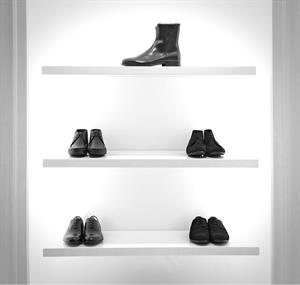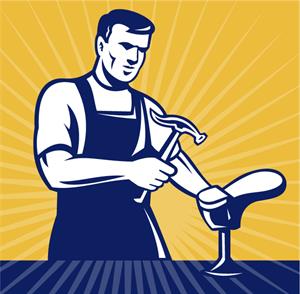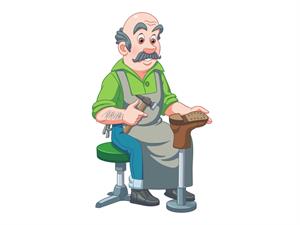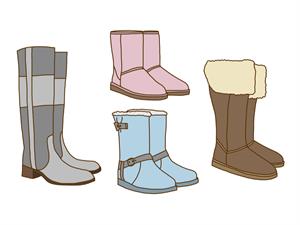
PUMPA - SMART LEARNING
எங்கள் ஆசிரியர்களுடன் 1-ஆன்-1 ஆலோசனை நேரத்தைப் பெறுங்கள். டாப்பர் ஆவதற்கு நாங்கள் பயிற்சி அளிப்போம்
Book Free Demo'John Galsworthy' is the author of the lesson 'Quality'. The author of this story spoke about a wonderful man who spent his entire life working on quality. His name was Gessler. He was the story's protagonist and the youngest of two Gessler brothers. He worked as a bootmaker. Since the author was a child, he had known Gessler as the designer of the author's father's boots. The bootmaker lived with his brother at the shop, which indicates that he did not have a home.
The Gessler brothers were German immigrants who started their bootmaking business on a small bystreet in a famous part of London.
Although there were numerous shops on the street, the bootmaker's shop stood out. Unlike other shops, the author's favourite bootmaker's shop appeared to be simple. Outside the shop, only the name Gessler Brothers and a few pairs of boots on display were seen.
Although there were numerous shops on the street, the bootmaker's shop stood out. Unlike other shops, the author's favourite bootmaker's shop appeared to be simple. Outside the shop, only the name Gessler Brothers and a few pairs of boots on display were seen.

Boots on the display
Gessler brothers never made any readymade boots because they were more concerned about quality. They stitched boots only according to the customer's foot size and the style the customer would desire. So, Gessler made only what was ordered, and everything he made was perfect. One could not find any flaw in the boots he made.
According to the author, the bootmaker was solely reliant on his hard work and skill. As a result, he didn't want his shop to be advertised. Nevertheless, the author has always admired and appreciated the boots made by the bootmaker. The author was amazed by the bootmaker's handiwork and wondered as to how he achieved such perfection.
According to the author, the bootmaker was solely reliant on his hard work and skill. As a result, he didn't want his shop to be advertised. Nevertheless, the author has always admired and appreciated the boots made by the bootmaker. The author was amazed by the bootmaker's handiwork and wondered as to how he achieved such perfection.
The author recounts an incident from his youth in which he asked Gessler about the challenges he encountered in his career. And, the bootmaker replied to him with a smile: It is an art!'. Mr. Gessler looked at his work as an artistic creation. Also, one could observe a change in the Gessler brothers' accents throughout the lesson (pronouncing p, t, k as b, d, g). It was due to influence from their mother tongue (German).
Since the boots purchased from Gessler's shop lasted for a long time, there wasn't any need for the author to visit Gessler's shop often. The author complements the bootmaker's work, stating, 'because the bootmaker's boots were created with great effort and prepared with good quality leather, they lasted for a longer amount of time.' The author emphasises the bootmaker's intellect here. He claims that the bootmaker knows how to produce high-quality boots.
Also, according to the author, the ambience of the shop was unique, unlike other shops. He always felt the peaceful atmosphere after stepping inside Gessler's shop. So, he compares Gessler's shop to that of the church as he thought it provided peace to a person while waiting at the wooden chair inside the shop.
Since the boots purchased from Gessler's shop lasted for a long time, there wasn't any need for the author to visit Gessler's shop often. The author complements the bootmaker's work, stating, 'because the bootmaker's boots were created with great effort and prepared with good quality leather, they lasted for a longer amount of time.' The author emphasises the bootmaker's intellect here. He claims that the bootmaker knows how to produce high-quality boots.
Also, according to the author, the ambience of the shop was unique, unlike other shops. He always felt the peaceful atmosphere after stepping inside Gessler's shop. So, he compares Gessler's shop to that of the church as he thought it provided peace to a person while waiting at the wooden chair inside the shop.
The author also says one could hear the guttural sound and tip-tap of the bootmaker shoes that tapped the stairs as he descends the stairs to attend a customer entering the Gessler's shop. In addition, the author has provided a brief description of the bootmaker's appearance. The author says that the bootmaker would be dressed in a leather apron, with his shirt-sleeves turned back and slightly bent towards the buyer. Since he was always immersed in his job, he'd blink as if he'd just awoken from a dream about boots whenever a customer entered his shop.

Mr. Gessler
The author here emphasises the bootmaker's dedication and commitment to his profession. As previously said, the bootmaker regards boot design as an art rather than a job.
The author here emphasises the bootmaker's dedication and commitment to his profession. As previously said, the bootmaker regards boot design as an art rather than a job.
The bootmaker was a quiet man who was always preoccupied with his profession. If the author walked inside Gessler's shop, he would place his order for a pair of Russian leather boots, as he always does, and the bootmaker would leave to bring him the leather piece.
Because he was a workaholic, the bootmaker rarely spoke. He had always responded with the author's request without question. Russian leather is widely used in the manufacture of footwear. These leathers are both strong and flexible, and so it has a longer duration. So, the bootmaker might have used it due to its high quality.
While the bootmaker would be busy looking for the leather piece, the author would relax in a wooden chair, inhaling the leather smell inside the Gessler's shop. And, when the bootmaker would return to the author with the leather piece, the author could hear him appreciating its beauty (the leather piece) with a German accent. Indeed, it would be admired by the author as well. The author's estimated delivery date for the boots would be the next question for him to answer. The author would refuse to give him a deadline for receiving the boots. He'd instead leave it up to the bootmaker.
The bootmaker would promise that the boots would be ready in fifteen days. 'Tomorrow fortnight' means two weeks from tomorrow. If the person looking after the author were his older brother, he would reply that he will inform the author of the boot delivery date after speaking with his brother.
While the bootmaker would be busy looking for the leather piece, the author would relax in a wooden chair, inhaling the leather smell inside the Gessler's shop. And, when the bootmaker would return to the author with the leather piece, the author could hear him appreciating its beauty (the leather piece) with a German accent. Indeed, it would be admired by the author as well. The author's estimated delivery date for the boots would be the next question for him to answer. The author would refuse to give him a deadline for receiving the boots. He'd instead leave it up to the bootmaker.
The bootmaker would promise that the boots would be ready in fifteen days. 'Tomorrow fortnight' means two weeks from tomorrow. If the person looking after the author were his older brother, he would reply that he will inform the author of the boot delivery date after speaking with his brother.
The author would thank Mr. Gessler after ordering the boots, but the bootmaker would thank him back, starring at the leather in his hand. As the author would move towards the door, the tip-tap of the bootmaker's shoes could be heard indicating that he was returning to his job, his dream of boots.
The author also lets the reader know about a horrible experience he had one day in Gessler's shop, where he complained to the bootmaker about a pair of boots which creaked. The bootmaker was at a loss for words when it came to responding to the author because the bootmaker was more certain that his work would be of high quality.
The author also lets the reader know about a horrible experience he had one day in Gessler's shop, where he complained to the bootmaker about a pair of boots which creaked. The bootmaker was at a loss for words when it came to responding to the author because the bootmaker was more certain that his work would be of high quality.
For a long time, he stared at the author without replying anything, as if he expected the author to withdraw or clarify his statements. "It shouldn't have creaked," with more confidence in his job quality, the bootmaker replied to the author. Despite this, the author did not withdraw his complaint and continued to complain about the creaking boots. But, while repeating the complaint, the author was afraid.
The author had no intention of injuring the bootmaker, but he was afraid that his complaint would. The bootmaker then inquired the author if he had moistened the boots before allowing them to mould to the shape of his foot, to which the author replied that he hadn't. At that point, the bootmaker dropped his eyes, as if trying to recollect those boots, and the author felt bad for bringing up such a serious subject.
The bootmaker then explained to the author that some leathers used for boots were defective from the outset. As a result, he requested that the author bring those squeaked boots to be repaired. The bootmaker also guaranteed to refund the author's money if he could not fix the boots or were irreparably damaged.
The author had no intention of injuring the bootmaker, but he was afraid that his complaint would. The bootmaker then inquired the author if he had moistened the boots before allowing them to mould to the shape of his foot, to which the author replied that he hadn't. At that point, the bootmaker dropped his eyes, as if trying to recollect those boots, and the author felt bad for bringing up such a serious subject.
The bootmaker then explained to the author that some leathers used for boots were defective from the outset. As a result, he requested that the author bring those squeaked boots to be repaired. The bootmaker also guaranteed to refund the author's money if he could not fix the boots or were irreparably damaged.
From the time the author was a child, he wore boots made by Gessler's siblings. In an emergency, the author once purchased a pair of boots from a large firm. And, the author walked into Gessler's shop with such boots, quite absent-mindedly.
When the author placed the order, the bootmaker took his order without showing him the leather material as he was busy observing the boots the author was wearing. The author could feel his (bootmaker's) stare piercing his foot's inferior covering. It's possible that the bootmaker was upset because he'd spotted the author wearing boots he'd bought elsewhere. The author, after all, was a regular customer. And the bootmaker produced a higher-quality product than he was paid for. "Those are not my boots," the bootmaker told the author after examining his boots for a time.
Following such remarks, the author felt depressed. Despite the fact that his voice was not one of anger, sadness, or even disrespect, the author was scared by his emotionless tone. He put his hand on the painful area of his left boot and pushed a finger against it. Because the bootmaker was an expert in the profession, he knew how to assess the quality of a boot. As a result, he was able to pinpoint the specific spot in the boot where it was uncomfortable.
When the bootmaker touched his finger on an uncomfortable spot on the left boot, he enquired whether it hurt. He said major firms lack self-respect. He was implying that the leather used in big firms or the entire production was of low quality.
Gessler grew enraged upon explaining the details about the big companies as if something within him had given way. He then told the author about major firms' inferior quality products. It was the first and only time the author had ever heard him speak about the circumstances and challenges of his job. Mr. Gessler had never spoken so much, except for that one time when he spoke for a long period in a harsh tone.
His dislike for his competitive (big) firms was evident in his comments. Then he began to complain about large companies, claiming that they attract consumers through advertisements rather than through their work. Such companies are more concerned with profit than with quality. He explained to the author how big companies use advertisements to pull clients away from small businesses, putting small business owners at a disadvantage.
As a result, the bootmaker lost the majority of his customers year after year. The author then realised the challenges of the bootmaker and the difficulties of small businesses that relied on hard effort rather than marketing. Also, the author noticed things he'd never noticed before while looking at the bootmaker's wrinkled face. He observed bitter things, bitter pain, and so many grey hairs appeared to have sprung from his red beard, indicating Gessler had gotten too old; in his struggle against the competition!
The author felt bad about purchasing the boots from a large company. And the author tried his best to explain the scenario (which arose out of necessity) around buying those unfortunate shoes. However, the bootmaker's appearance and words had such an impact on the author that he ordered many pairs in the next few minutes. The author ordered those pairs because he felt sorry for the bootmaker. Even still, it was a good thing he ordered those boots because they lasted longer than they had ever done before.
The author's boots, as previously stated, were crafted of high-quality leather and was expertly stitched with the essence of sewing to ensure that they would endure for a long time. As a result, it took two years for the author to return to Gessler's shop.
Many months later, the author returned to the shop. Over there, he noticed one of the Gessler brothers. He was mistaken for the older Gessler sibling, who was holding a piece of leather in his hand. The author started conversing with him thinking he was the elder Gessler. But it was not Gessler's elder brother; he went close to the author and looked at him carefully as he was having trouble in recognising the author. The younger Gessler then told him that he was fine, but his elder brother was dead.
The author's boots, as previously stated, were crafted of high-quality leather and was expertly stitched with the essence of sewing to ensure that they would endure for a long time. As a result, it took two years for the author to return to Gessler's shop.
Many months later, the author returned to the shop. Over there, he noticed one of the Gessler brothers. He was mistaken for the older Gessler sibling, who was holding a piece of leather in his hand. The author started conversing with him thinking he was the elder Gessler. But it was not Gessler's elder brother; he went close to the author and looked at him carefully as he was having trouble in recognising the author. The younger Gessler then told him that he was fine, but his elder brother was dead.
The author was taken aback when he learned of his elder brother's death. The loss of the elder Gessler grieved the author. The author mistook the younger Gessler to be the elder Gessler, and soon after their conversation, the author realised his misunderstanding because his appearance showed that he resembled his elder brother. The younger Gessler appeared exhausted and pale. The reason was obvious to the author. The Gessler brothers worked twenty - four hours a day, seven days a week, to retain the few clients.
And, when the author expressed his sincere sorrow for the eldest brother's death, the bootmaker responded, "he was a good man, he made a good bood. But he is dead.". The younger Gessler's statements expressed his affection for his older brother and how much he missed him. After all, the Gessler brothers worked around the clock to run the Gessler shop and supply high-quality products.
The Gessler brothers had no disagreements about profit or the quality of the boots they created. They worked together for quality rather than profit. People who knew the Gessler brothers would agree that they were the best bootmakers they had ever seen. The Gessler brothers were the greatest bootmakers anyone had ever seen, according to those who knew them. It's no wonder that the author was saddened by the loss of such a great man (the elder Gessler). Then the younger Gessler touched the top of his head, where his hair had suddenly thinned to the same extent as his unfortunate brother's as if to suggest the cause of his death. "Do you want any boots?" he then inquired of the author. He showed the author the beautiful piece of leather he was holding.
As previously stated, the Gessler brothers may have lost clients due to insufficient advertising, failure to fulfil client deadlines, and other factors. As a result, they must have continued to work hard without taking enough breaks to deliver boots in less time and keep their customers. As a result, the Gessler brother's death and younger Gessler's aged appearance were most likely caused by this.
The Gessler brothers had no disagreements about profit or the quality of the boots they created. They worked together for quality rather than profit. People who knew the Gessler brothers would agree that they were the best bootmakers they had ever seen. The Gessler brothers were the greatest bootmakers anyone had ever seen, according to those who knew them. It's no wonder that the author was saddened by the loss of such a great man (the elder Gessler). Then the younger Gessler touched the top of his head, where his hair had suddenly thinned to the same extent as his unfortunate brother's as if to suggest the cause of his death. "Do you want any boots?" he then inquired of the author. He showed the author the beautiful piece of leather he was holding.
As previously stated, the Gessler brothers may have lost clients due to insufficient advertising, failure to fulfil client deadlines, and other factors. As a result, they must have continued to work hard without taking enough breaks to deliver boots in less time and keep their customers. As a result, the Gessler brother's death and younger Gessler's aged appearance were most likely caused by this.
The author felt pity for the bootmaker. He then ordered several pairs of boots, and they took a long time to arrive, which indicated two things to the author. Mr. Gessler would have gone weaker than before. And, since he didn't have his elder brother to help, he must have done all the work independently. Despite the time taken by Gessler, the boots designed by him were better than they had ever been. They couldn't possibly be worn down. Soon after then, the author went abroad.
The author spent over a year abroad. After returning to London, the author's first visit was to his old friend's shop (Gessler's shop). When the author left London, Mr. Gessler seemed to be a sixty-year-old man. But after a year, when he visited the Gessler's shop, he was shocked to see Gessler appearing as a seventy-five-year-old man. The younger Gessler's appearance was completely changed in a year as he seemed to be fifteen years older in just one year.
The author spent over a year abroad. After returning to London, the author's first visit was to his old friend's shop (Gessler's shop). When the author left London, Mr. Gessler seemed to be a sixty-year-old man. But after a year, when he visited the Gessler's shop, he was shocked to see Gessler appearing as a seventy-five-year-old man. The younger Gessler's appearance was completely changed in a year as he seemed to be fifteen years older in just one year.

Gessler's aged appearance
Mr. Gessler looked pinched and worn, and did not recognise the author at first. The author was also taken aback when he realised Mr. Gessler had no idea who the author was.
Mr. Gessler then enquired the author if he wanted any boots? He also assured the author that he would fulfil his order as quickly as possible because he had no other clients. The author agreed to him and ordered all kinds of boots that appealed to him in the shop.
Mr. Gessler looked pinched and worn, and did not recognise the author at first. The author was also taken aback when he realised Mr. Gessler had no idea who the author was.
Mr. Gessler then enquired the author if he wanted any boots? He also assured the author that he would fulfil his order as quickly as possible because he had no other clients. The author agreed to him and ordered all kinds of boots that appealed to him in the shop.
The author waited for his ordered boots. But, it took a long time. Because the order was taking so long to arrive, the author had given up on those boots and the hope that they might come eventually. However, the author received all of the ordered boots after several days, on one evening. The author tried all the boots designed by Mr. Gessler, one by one. They were the greatest he had ever created in terms of leather quality, shape and fit, as well as finish. Immediately, the author rushed downstairs, wrote a check, and posted it on his own.

Well-crafted boots
A week after receiving the order, the author passed by the bystreet where Mr. Gessler's shop was located. The author thought to visit Gessler's shop and tell him how well the new boots fit. But, when the author arrived at the location of his shop, he was shocked for a while. The reason behind this was, the name on the board (Gessler Brothers) was gone. The author then walked into the shop with much anxiety.
Instead of Gessler, a young Englishman was seen inside Gessler's shop. Mr. Gessler was nowhere to be seen. The author sensed something amiss.

An Englishman in Gessler’s shop
Gessler could no longer bear the shock, and he directly inquired the new labour (Englishman) in Gessler's shop about him (Gessler). The Englishman informed the author that Gessler was no longer available. He then went on to say that he was happy to help with anything and that he had taken over the shop.
However, the author did not listen to his comment and kept repeating his question as the author was confused and his mind was full of questions about Gessler. The Englishman recognised the author's worry for Gessler and replied that Gessler was no longer alive.
The author did not have expected such an answer from the stranger (Englishman); he was struck for a while. The author couldn't accept the stranger's (Englishman) words. He informed the man that he couldn't be dead because he had only gotten the boots last Wednesday. The author's mind did not accept the fact that his old friend was dead.
However, the author did not listen to his comment and kept repeating his question as the author was confused and his mind was full of questions about Gessler. The Englishman recognised the author's worry for Gessler and replied that Gessler was no longer alive.
The author did not have expected such an answer from the stranger (Englishman); he was struck for a while. The author couldn't accept the stranger's (Englishman) words. He informed the man that he couldn't be dead because he had only gotten the boots last Wednesday. The author's mind did not accept the fact that his old friend was dead.
While the news of young Gessler's death was terrible, the cause of his death was far worse. The Englishman began to explain to the author the circumstances behind Gessler's death. According to the Englishman, Gessler starved himself to death, as the physicians said he died of slow starvation because Gessler focused only on his career and paid little attention to his health.
Mr. Gessler refused to allow anyone to help him and kept his shop open late at night. Despite the fact that Gessler worked day and night, he lost clients since the orders were not completed on time. Despite this, Gessler continued to put in long hours. Despite being the finest bootmaker in London, he failed in business because he did not know how to compete.
Mr. Gessler refused to allow anyone to help him and kept his shop open late at night. Despite the fact that Gessler worked day and night, he lost clients since the orders were not completed on time. Despite this, Gessler continued to put in long hours. Despite being the finest bootmaker in London, he failed in business because he did not know how to compete.
Furthermore, Gessler never advertised his products. As previously stated, despite using the finest leather, Gessler's business failed since he never had someone to assist him while working on the ordered boots. Gessler's business failure was primarily due to poor planning, a lack of labour, a lack of money, a failure to fulfil client deadlines, and a lack of advertising.
Mr. Gessler's death was still a mystery to the author. The author still couldn't understand how starvation can be a cause for Mr. Gessler's death.
The Englishman then proceeded to explain the author. He informed the author that while stating Gessler died of starvation seemed a little fancy and exaggerated, it was the truth.
The man said he used to keep track of his acts from dawn to night, right up until the last boot he put on his last day. The bootmaker (Gessler) was a poor man who never ate and had no money. He'd put all of his money on rent and leather, but not food. He also added that seeing someone so old go so long without eating astounded him. At last, Gessler's passion for his art took away his life. Though Gessler had a unique personality, he created excellent boots. 'Yes, he made good boots,' the author replied with a heavy heart.
The Englishman then proceeded to explain the author. He informed the author that while stating Gessler died of starvation seemed a little fancy and exaggerated, it was the truth.
The man said he used to keep track of his acts from dawn to night, right up until the last boot he put on his last day. The bootmaker (Gessler) was a poor man who never ate and had no money. He'd put all of his money on rent and leather, but not food. He also added that seeing someone so old go so long without eating astounded him. At last, Gessler's passion for his art took away his life. Though Gessler had a unique personality, he created excellent boots. 'Yes, he made good boots,' the author replied with a heavy heart.